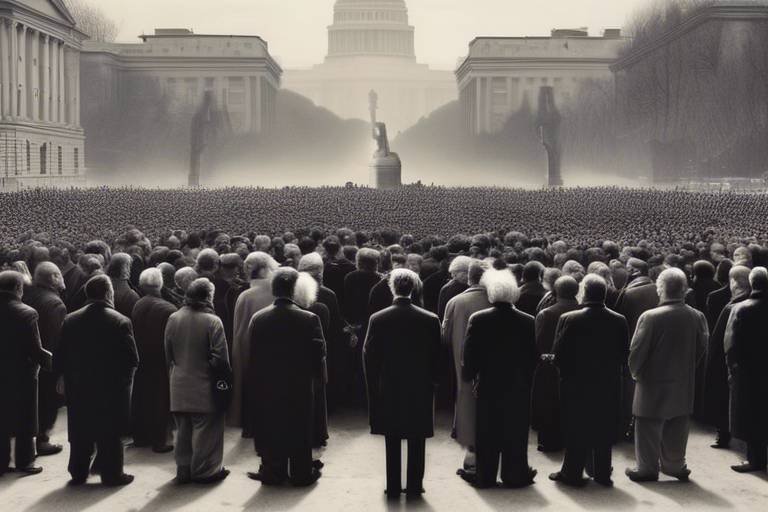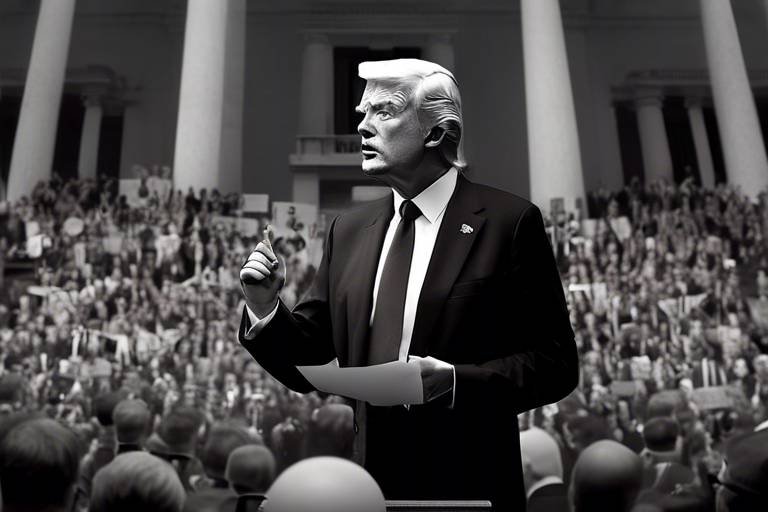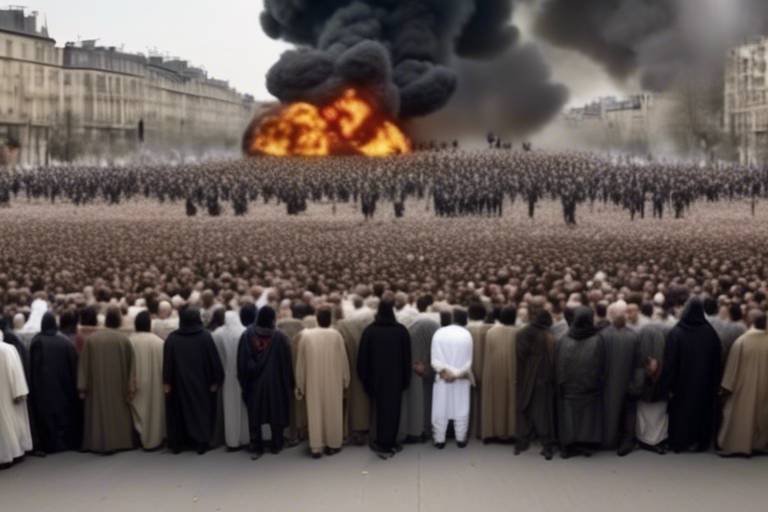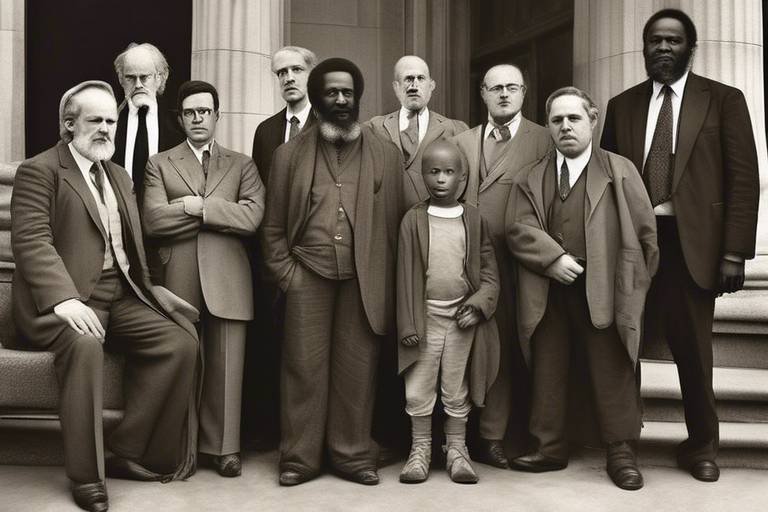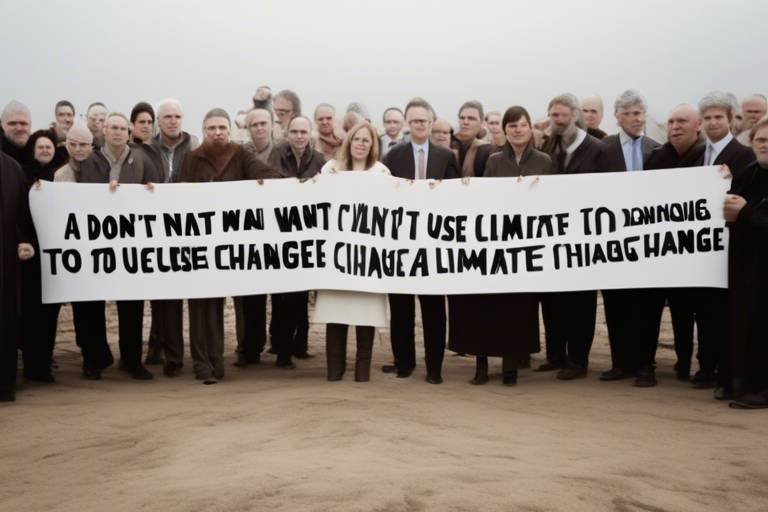Philosophy, Politics, and the Shaping of Public Policy
In an ever-evolving world, the intricate relationship between philosophy and politics plays a crucial role in shaping public policy. At first glance, one might think these two realms are distinct, but they are, in fact, deeply intertwined. Philosophy provides the foundational principles that guide our understanding of justice, governance, and the role of the state in our lives. It raises essential questions about what is right and wrong, what constitutes a good society, and how individuals relate to one another and to authority. Political action, on the other hand, is the manifestation of these philosophical ideas into tangible policies that affect our daily lives.
Imagine a world where every policy decision was made without any ethical consideration or philosophical grounding. It would be chaotic, akin to a ship sailing without a compass, lost at sea. Just as a compass guides a ship to its destination, philosophy guides political ideologies and actions, ensuring that public policies are not just reactions to immediate needs but are thoughtful responses to the deeper questions of human existence.
Throughout history, philosophers have pondered the nature of power, authority, and the rights of individuals. Their ideas have sparked revolutions, shaped nations, and influenced countless public policies. From the ancient musings of Plato and Aristotle to the revolutionary thoughts of John Locke, the evolution of political thought is a testament to the enduring power of philosophy. These thinkers have laid the groundwork for contemporary discussions around governance, democracy, and the ethical implications of policy-making.
As we delve deeper into this relationship, we will explore how philosophical frameworks shape political beliefs and influence decision-making processes within governments. We will also examine historical contexts that have molded contemporary public policy frameworks, highlighting the lessons we can learn from the past. In this journey, we will uncover the profound impact of ideas such as social contract theory and utilitarianism on modern governance, revealing how these concepts continue to resonate in today's political landscape.
Ultimately, understanding the relationship between philosophy, politics, and public policy is not just an academic exercise; it is essential for anyone who wishes to engage meaningfully in the world around them. By grasping these connections, we empower ourselves to advocate for policies that reflect our collective values and aspirations, paving the way for a more just and equitable society.
- What is the significance of philosophy in politics? Philosophy provides the ethical foundation and guiding principles for political ideologies, influencing how policies are formulated and implemented.
- How do historical events shape public policy? Historical contexts provide lessons and frameworks that inform contemporary public policies, reflecting the evolution of societal values and beliefs.
- What role does ethics play in public policy? Ethics are crucial in guiding policy decisions, ensuring that they align with societal values and the common good.

The Role of Philosophy in Politics
Philosophy serves as the bedrock upon which political ideologies are constructed. It provides the essential principles that guide our understanding of governance, rights, and justice. When we delve into the realm of politics, we often find ourselves asking profound questions: What is the nature of justice? What rights do individuals possess? How should power be distributed? These inquiries are not merely academic; they are the lifeblood of political discourse and decision-making.
Throughout history, various philosophical frameworks have shaped political beliefs and influenced the decision-making processes within governments. For instance, the ideas of liberalism, conservatism, and socialism can all trace their roots back to distinct philosophical traditions. Each of these ideologies offers unique perspectives on individual rights, societal obligations, and the role of the state. At the heart of these discussions lies the question of how we define the common good and the moral responsibilities of those in power.
One of the most significant contributions of philosophy to politics is the concept of the social contract. This idea, championed by thinkers like Hobbes, Locke, and Rousseau, posits that individuals consent, either explicitly or implicitly, to surrender some of their freedoms in exchange for the protection of their remaining rights. This framework not only establishes the legitimacy of governmental authority but also serves as a guideline for evaluating the justice of laws and policies. In essence, the social contract is a philosophical lens through which we can assess the ethical dimensions of governance.
Moreover, the interplay between philosophy and politics is evident in the ongoing debates surrounding utilitarianism. This ethical theory, which advocates for actions that maximize overall happiness, significantly influences public policy decisions. Policymakers often grapple with the challenge of balancing the needs of the majority against the rights of minorities, raising crucial ethical dilemmas about fairness and equity. For example, when implementing policies on healthcare or education, the utilitarian approach may prioritize the greatest benefit for the largest group, potentially overlooking the needs of vulnerable populations.
In today’s rapidly changing political landscape, the role of philosophy in shaping public policy remains more relevant than ever. As we confront complex global issues such as climate change, inequality, and technological advancement, philosophical inquiry provides a framework for understanding the ethical implications of our choices. It encourages us to reflect on our values, question our assumptions, and strive for a more just society. Ultimately, philosophy not only informs our political beliefs but also empowers us to engage critically with the world around us.

Historical Perspectives on Public Policy
Understanding the evolution of public policy is akin to peeling back the layers of an onion; each layer reveals a different historical context, filled with its own complexities and nuances. Public policy does not emerge in a vacuum; rather, it is shaped by the prevailing philosophies, societal needs, and political climates of its time. Throughout history, various significant events have acted as catalysts for change, influencing how we govern and the policies we implement today.
One of the most profound periods in shaping modern public policy was the Enlightenment, a time when reason and individualism began to take precedence over tradition. Thinkers like John Locke and Thomas Hobbes challenged the status quo, advocating for the rights of individuals and the concept of the social contract. Their ideas laid the groundwork for democratic governance and the notion that government derives its authority from the consent of the governed. This revolutionary shift in thought directly influenced the formation of modern democratic institutions.
Another pivotal moment came during the Industrial Revolution, which drastically transformed societies. Rapid urbanization and economic changes led to new social challenges, including poverty, labor rights, and public health issues. In response, governments began to adopt policies aimed at regulating working conditions and addressing social welfare. The rise of social policies during this era can be seen as a direct response to the philosophical underpinnings of utilitarianism, where the focus shifted towards achieving the greatest good for the greatest number.
To illustrate the historical evolution of public policy, consider the following table that outlines key events and their impacts:
| Year | Event | Impact on Public Policy |
|---|---|---|
| 1689 | English Bill of Rights | Established the principle of parliamentary sovereignty and individual rights. |
| 1776 | American Declaration of Independence | Emphasized the rights of individuals and the need for government accountability. |
| 1848 | European Revolutions | Highlighted the demand for democratic reforms and social justice. |
| 1930s | The New Deal | Introduced significant social welfare policies in response to the Great Depression. |
| 1960s | Civil Rights Movement | Led to policies aimed at promoting equality and combating discrimination. |
As we traverse through history, it’s evident that public policy is a living entity, constantly evolving to meet the needs of society. Each historical event not only reflects the challenges of its time but also embodies the philosophical debates that shaped them. For instance, the debates surrounding the role of government in economic affairs during the Great Depression led to a more interventionist approach, which is still a topic of contention today.
Furthermore, the interplay between historical events and philosophical thought is crucial in understanding contemporary public policy debates. The rise of globalization and technological advancements has introduced new challenges, prompting policymakers to revisit the foundational principles established by earlier philosophers. In essence, the past serves as a guide, reminding us of the intricate relationship between philosophy, politics, and public policy.
In conclusion, the historical perspectives on public policy reveal a tapestry woven from the threads of philosophical thought, societal needs, and political action. By studying these layers, we gain valuable insights into the nature of governance and the ethical considerations that continue to shape our world today.

Influential Philosophers and Their Ideas
Throughout history, several philosophers have profoundly impacted political thought, laying the groundwork for our modern understanding of governance and public policy. Their ideas have not only shaped political ideologies but also influenced the ethical frameworks that guide decision-making in government. One cannot discuss the evolution of political philosophy without mentioning the likes of Plato, Aristotle, and John Locke. Each of these thinkers contributed unique perspectives that continue to resonate today.
Plato, in his work "The Republic," introduced the concept of an ideal state governed by philosopher-kings, individuals who possess the wisdom and virtue necessary to rule justly. He believed that knowledge and virtue were essential for effective governance, arguing that only those who understand the true nature of justice could create a just society. Plato’s vision encourages us to consider the importance of education and the moral character of leaders in shaping public policy.
Aristotle, Plato's student, took a more practical approach. In his seminal work "Politics," he analyzed various political systems and emphasized the importance of the middle class in achieving stability and justice. Aristotle argued that a government should aim for the common good, promoting the welfare of all citizens rather than a select few. His idea of virtue ethics underscores the significance of moral character in political life, suggesting that ethical leaders are essential for effective governance.
Fast forward to the Enlightenment, and we encounter John Locke, whose ideas about natural rights and government by consent have had a lasting impact on democratic thought. Locke argued that individuals possess inherent rights to life, liberty, and property, and that governments exist to protect these rights. His social contract theory laid the foundation for modern democratic governance, emphasizing the role of the citizen in holding leaders accountable. Locke’s philosophy invites us to reflect on the relationship between individual rights and state authority, a critical consideration in contemporary public policy debates.
| Philosopher | Key Ideas | Impact on Public Policy |
|---|---|---|
| Plato | Philosopher-kings, ideal state | Emphasis on moral leadership and education |
| Aristotle | Middle class, common good | Importance of virtue ethics in governance |
| John Locke | Natural rights, government by consent | Foundation of democratic principles and individual rights |
These philosophers not only shaped the way we think about politics but also laid the groundwork for the ethical considerations that inform public policy today. Their ideas encourage us to ponder questions like: What is the role of the state in ensuring justice? and How should we balance individual rights with the common good? As we navigate the complexities of modern governance, the philosophical insights of these thinkers remain relevant, guiding us in our quest for a just and equitable society.
In conclusion, the ideas of influential philosophers have created a rich tapestry of thought that continues to influence public policy. By examining their contributions, we gain valuable insights into the ethical dimensions of governance and the responsibilities of leaders in shaping a better world for all.
- Who is considered the father of political philosophy? Plato is often regarded as the father of political philosophy due to his foundational work in the field.
- How did Aristotle influence modern governance? Aristotle's emphasis on the middle class and the common good has influenced contemporary democratic practices.
- What is the significance of Locke's social contract theory? Locke's theory is crucial in understanding the principles of democracy and individual rights in modern governance.

Social Contract Theory
The concept of is a cornerstone in the study of political philosophy, offering profound insights into the relationship between individuals and the state. At its core, this theory posits that individuals consent, either explicitly or implicitly, to surrender some of their freedoms and submit to the authority of a governing body in exchange for protection of their remaining rights. This foundational idea has been explored and articulated by several key philosophers throughout history, each adding their unique perspective to the discourse.
One of the earliest and most influential proponents of social contract theory was Thomas Hobbes. In his seminal work, Leviathan, Hobbes argued that in a state of nature—where no government exists—life would be "solitary, poor, nasty, brutish, and short." To escape this chaos, individuals would agree to form a social contract, yielding their individual rights to a sovereign authority, which would maintain peace and order. Hobbes’ vision was largely pessimistic, emphasizing the need for a powerful central authority to prevent societal collapse.
In stark contrast, Jean-Jacques Rousseau presented a more optimistic view of human nature in his work, The Social Contract. Rousseau believed that individuals are inherently good but become corrupted by society. He argued that the social contract should be based on the collective will of the people, known as the "general will." This idea emphasizes that legitimate political authority arises not from coercion but from the consent of the governed, fostering a more democratic and participatory form of governance.
To better understand the implications of social contract theory, consider the following key principles:
- Consent: The legitimacy of authority derives from the consent of the governed.
- Mutual Benefit: Individuals surrender certain freedoms for collective security and welfare.
- Accountability: The governing body is accountable to the people and must act in their best interests.
Moreover, social contract theory has profound implications for public policy. It raises essential questions about the responsibilities of the state towards its citizens and the extent to which individuals should sacrifice their freedoms for security. For instance, during times of crisis, such as a pandemic or national emergency, governments may impose restrictions that challenge the balance between individual rights and collective safety.
In summary, social contract theory not only lays the groundwork for understanding governance but also serves as a vital framework for evaluating contemporary public policy issues. By examining the ideas of Hobbes and Rousseau, we can appreciate the ongoing relevance of social contract theory in discussions about state authority, individual rights, and the ethical dimensions of governance.
- What is the main idea of social contract theory?
Social contract theory suggests that individuals consent to surrender some freedoms to a governing body in exchange for protection and order. - Who are the key philosophers associated with social contract theory?
Key figures include Thomas Hobbes, Jean-Jacques Rousseau, and John Locke, each offering different perspectives on the nature of the social contract. - How does social contract theory apply to modern governance?
This theory helps frame discussions about the legitimacy of authority, individual rights, and the responsibilities of the state in contemporary policy debates.

Utilitarianism in Policy Decisions
Utilitarianism, a philosophical doctrine that champions the idea of maximizing overall happiness, plays a crucial role in shaping public policy decisions. At its core, this ethical framework posits that the rightness or wrongness of actions is determined by their consequences, specifically the extent to which they promote the greatest good for the greatest number. This principle has profound implications for policymakers who must navigate the often turbulent waters of societal needs and desires.
When policymakers adopt a utilitarian approach, they focus on outcomes rather than intentions. This means that decisions are made based on a calculated assessment of potential benefits and harms. For instance, consider a government deciding whether to implement a new healthcare policy. A utilitarian analysis would involve weighing the potential health benefits for the population against the costs and drawbacks of the policy. If the benefits—such as improved public health and increased life expectancy—outweigh the costs, then the policy would be deemed justifiable.
However, the application of utilitarianism in public policy is not without its challenges. One significant issue arises from the difficulty in accurately measuring happiness or well-being. How do we quantify the happiness of individuals? Furthermore, utilitarianism can sometimes lead to morally questionable decisions. For example, if a policy benefits the majority but severely disadvantages a minority, it raises ethical concerns about justice and fairness. This dilemma often leads to heated debates among policymakers, ethicists, and the public.
To illustrate this concept further, let’s consider a hypothetical scenario involving a city facing budget cuts. The city council must decide whether to allocate funds to improve public transportation or to enhance recreational facilities. A utilitarian approach would analyze the potential benefits of each option:
| Option | Potential Benefits | Target Population |
|---|---|---|
| Improve Public Transportation | Increased accessibility, reduced traffic congestion, lower carbon emissions | Commuters, low-income individuals, environment |
| Enhance Recreational Facilities | Improved public health, community engagement, increased tourism | Families, tourists, local businesses |
In this case, the city council would weigh the broader societal benefits of improved public transportation—such as accessibility for low-income individuals and environmental impact—against the community benefits of enhanced recreational facilities. The decision ultimately hinges on which option provides greater overall happiness and well-being for the community.
Despite its strengths, utilitarianism must be applied with caution in policy decisions. Policymakers must remain vigilant about the potential for unintended consequences and ensure that the rights of minority groups are protected. Balancing the needs of the majority with the rights of the few is a delicate dance that requires ongoing dialogue and ethical consideration.
In conclusion, while utilitarianism provides a valuable framework for evaluating public policy decisions, it is essential for policymakers to navigate its complexities thoughtfully. By considering both the quantitative and qualitative aspects of happiness and well-being, they can strive to create policies that not only maximize benefits for the greatest number but also uphold ethical standards and social justice.
- What is utilitarianism? Utilitarianism is a philosophical theory that suggests that the best action is the one that maximizes overall happiness or utility.
- How does utilitarianism influence public policy? It influences public policy by encouraging decision-makers to consider the outcomes of their actions and prioritize policies that yield the greatest benefit for the most people.
- What are some criticisms of utilitarianism? Critics argue that it can justify morally questionable actions if they result in a net increase in happiness, and it often overlooks the rights and needs of minorities.
- Can utilitarianism be applied in all policy decisions? While it can be a useful framework, it may not be suitable for all situations, especially those involving complex ethical dilemmas.

Modern Political Philosophy
Modern political philosophy is a vibrant tapestry woven from the threads of diverse ideas, movements, and ethical considerations that continue to shape our world today. As we navigate through the complexities of governance, it's crucial to recognize how contemporary thinkers challenge traditional notions and propose new frameworks for understanding justice, liberty, and equality. Think about it: how do we define what is just in a rapidly changing society? This question drives the discourse in modern political philosophy, prompting us to question the status quo and explore innovative solutions to age-old problems.
At the heart of modern political philosophy lies the **debate over justice**. Philosophers like John Rawls and Robert Nozick have sparked significant discussions about what a just society looks like. Rawls, in his seminal work "A Theory of Justice," introduced the idea of the "veil of ignorance," a thought experiment that encourages individuals to design a society without knowledge of their personal circumstances. This concept pushes us to think about fairness and equality from a perspective that transcends self-interest. On the other hand, Nozick's libertarian approach emphasizes individual rights and entitlements, arguing that a just society is one that respects personal freedoms and property rights. These contrasting views illustrate the rich dialogue that characterizes modern political thought.
Moreover, the emergence of **postmodern philosophy** has introduced skepticism towards grand narratives and universal truths. Thinkers like Michel Foucault and Judith Butler challenge the very foundations of power and identity, urging us to reconsider how societal norms are constructed and maintained. This shift is particularly relevant in discussions about gender, race, and sexuality, where the intersectionality of identities plays a crucial role in shaping public policy. For instance, how do we ensure that policies are inclusive and equitable for all citizens, regardless of their backgrounds? The insights from postmodern philosophy compel policymakers to adopt a more nuanced approach to governance, recognizing the complexities of human experience.
In addition to these philosophical debates, the role of **globalization** has transformed the landscape of political philosophy. As nations become increasingly interconnected, issues such as climate change, migration, and economic inequality transcend borders, demanding a rethinking of our political frameworks. Philosophers like Martha Nussbaum advocate for a capabilities approach, emphasizing the importance of enabling individuals to achieve their full potential, regardless of their geographic location. This perspective not only highlights the ethical responsibilities of nations towards one another but also calls for a collective effort to address global challenges.
As we grapple with these modern philosophical inquiries, it's essential to recognize that they are not just theoretical discussions; they have real-world implications. Policymakers are often faced with the challenge of balancing competing values, such as liberty and equality, in their decision-making processes. The tension between individual rights and collective well-being is at the forefront of many contemporary debates, from healthcare reform to social justice movements. Therefore, understanding modern political philosophy equips us with the tools to critically assess policies and advocate for changes that reflect our evolving societal values.
In conclusion, modern political philosophy serves as a vital framework for understanding and addressing the complexities of today's political landscape. By engaging with the ideas of contemporary thinkers, we can foster a more inclusive and just society that reflects the diverse needs and aspirations of its citizens. So, as we move forward, let's keep asking the tough questions and remain open to new ideas that challenge our perceptions and inspire meaningful change.
- What is modern political philosophy? Modern political philosophy refers to contemporary ideas and theories that examine concepts of justice, liberty, and equality in the context of current societal challenges.
- Who are some key figures in modern political philosophy? Influential figures include John Rawls, Robert Nozick, Michel Foucault, and Martha Nussbaum, each contributing unique perspectives on justice and governance.
- How does modern political philosophy impact public policy? It influences public policy by providing frameworks to assess justice and equity, guiding policymakers in creating laws and regulations that reflect contemporary values.
- Why is it important to study modern political philosophy? Studying modern political philosophy helps us understand the ethical implications of political decisions and encourages critical thinking about societal norms and values.

The Intersection of Ethics and Public Policy
When we think about public policy, it’s easy to get lost in the nitty-gritty details of legislation, budgets, and political maneuvering. However, at the heart of effective governance lies a crucial element that often goes unnoticed: ethics. Ethics is not just a set of abstract principles; it’s the guiding compass that shapes the decisions made by policymakers. So, how do ethical considerations influence public policy, and why should we care? Let's dive into this fascinating intersection.
Ethics in public policy isn't just about doing the right thing; it’s about navigating the complex landscape of competing values and interests. Policymakers often face dilemmas where they must weigh the benefits of a decision against its potential harm. For instance, consider a government contemplating a new healthcare policy. On one hand, the policy could improve access to medical services for the underprivileged, but on the other hand, it might strain the budget, leading to cuts in other essential services. This is where ethical frameworks come into play, guiding decision-makers through the murky waters of public interest.
One of the primary challenges in ethical policymaking is balancing conflicting values. Policymakers must often consider:
- Equity: Ensuring fair treatment and access for all citizens.
- Efficiency: Making the best use of resources to achieve desired outcomes.
- Accountability: Being answerable to the public for decisions made.
- Transparency: Ensuring that the decision-making process is open to scrutiny.
Each of these values can pull in different directions, making it crucial for policymakers to establish a clear ethical framework that guides their decisions. For example, a policy aimed at increasing healthcare access may prioritize equity, but if it leads to inefficiencies that waste taxpayer money, it could undermine public trust. This is why ethical considerations are not just an add-on; they are essential to crafting policies that truly serve the public good.
Moreover, the role of public opinion cannot be overstated. Policymakers often gauge the ethical implications of their decisions based on how the public perceives them. If a policy is seen as unjust or harmful, it can lead to public backlash, protests, or even electoral consequences. Therefore, understanding the ethical dimensions of public policy is not just an academic exercise; it’s a practical necessity for those in power.
To illustrate the complexities of ethical policymaking, let’s look at a few real-world examples:
| Case Study | Ethical Dilemma | Outcome |
|---|---|---|
| Healthcare Reform | Balancing costs with access to care | Increased access but budget constraints led to service cuts |
| Environmental Regulations | Protecting the environment vs. economic growth | Stricter regulations led to job losses in some sectors |
| Data Privacy Laws | Protecting individual privacy vs. national security | Increased public trust but heightened security concerns |
These examples highlight the intricate dance between ethical considerations and public policy decisions. Each case presents its own set of challenges, and the outcomes often reflect the values prioritized by those in power. As society evolves, so too do the ethical frameworks that guide policymakers. This evolution is essential, as it ensures that public policy remains relevant and responsive to the needs of the people.
In conclusion, the intersection of ethics and public policy is a dynamic and complex space that demands careful consideration. Policymakers must navigate a landscape filled with competing values, public opinions, and ethical dilemmas. By grounding their decisions in robust ethical frameworks, they can create policies that not only address immediate needs but also foster trust and accountability in governance. As citizens, it's our responsibility to engage with these discussions, ensuring that our voices contribute to shaping a just and equitable society.
- What is the role of ethics in public policy? Ethics serves as a guiding framework that helps policymakers make decisions that are fair, just, and in the best interest of society.
- How do policymakers balance competing values? Policymakers often weigh the implications of their decisions against various ethical considerations, seeking to find a balance that serves the public good.
- Why is public opinion important in ethical policymaking? Public opinion influences policymakers' decisions, as they must consider how their actions will be perceived by the citizens they serve.

Case Studies in Ethical Policy Making
When it comes to ethical policy making, real-world examples often reveal the complexities and challenges that policymakers face. One of the most compelling case studies is the implementation of universal healthcare in various countries. For instance, countries like Canada and the United Kingdom have adopted systems that prioritize access to healthcare for all citizens, reflecting a strong ethical commitment to the principle of health as a human right. However, the journey has not been without its hurdles. In Canada, debates over funding and resource allocation have sparked discussions about the balance between equitable access and the sustainability of the healthcare system.
Another significant case study is the minimum wage legislation in the United States. The ethical implications of raising the minimum wage are profound, as they touch on issues of economic justice, worker dignity, and the overall health of the economy. Advocates argue that increasing the minimum wage helps lift families out of poverty, while opponents caution that it may lead to job losses and increased prices. This ongoing debate illustrates how ethical considerations can lead to divergent policy outcomes, depending on the values prioritized by different stakeholders.
Moreover, the environmental policy in the context of climate change provides another rich area for ethical analysis. The Paris Agreement is a prime example of how nations have come together to tackle a global crisis through ethical commitments to reduce carbon emissions. However, the challenge lies in ensuring that all countries, especially those with fewer resources, can meet their obligations without compromising their economic development. This situation raises important ethical questions about equity and responsibility on a global scale.
In examining these case studies, it becomes evident that ethical policy making is not just about adhering to a set of principles; it involves navigating a landscape filled with competing interests and values. Policymakers must grapple with questions such as: How do we define fairness? and What does it mean to act in the public good? These questions do not have easy answers, and the outcomes of policy decisions often reflect the underlying ethical frameworks that guide them.
To further illustrate the interplay between ethics and policy making, consider the following table that summarizes key case studies and their ethical implications:
| Case Study | Ethical Considerations | Outcomes |
|---|---|---|
| Universal Healthcare | Health as a human right | Increased access, debates over funding |
| Minimum Wage Legislation | Economic justice vs. job security | Varied state-level outcomes, ongoing debates |
| Climate Change Policy | Equity and global responsibility | International agreements, implementation challenges |
As we analyze these examples, it is vital to recognize that ethical policy making is a dynamic and evolving process. Policymakers must remain vigilant, adapting their approaches in response to new information, public sentiment, and changing ethical paradigms. The lessons learned from these case studies can serve as a guide for future initiatives, reminding us that the heart of effective governance lies in our ability to balance ethical considerations with practical realities.
Q: What is ethical policy making?
A: Ethical policy making involves creating policies that are guided by moral principles and values, ensuring that decisions benefit the public and promote justice.
Q: Why are case studies important in understanding ethical policy making?
A: Case studies provide real-world examples that illustrate the complexities and challenges policymakers face, helping to highlight the ethical implications of their decisions.
Q: How do ethical considerations influence public policy?
A: Ethical considerations influence public policy by guiding the values prioritized in decision-making processes, affecting outcomes and the overall impact on society.

The Role of Public Opinion
Public opinion is often described as the heartbeat of democracy. It’s the collective voice of the people, echoing their thoughts, beliefs, and desires. But how does this cacophony of voices shape public policy? The relationship between public opinion and political decision-making is intricate and multifaceted. Political leaders often find themselves in a delicate dance, balancing their own agendas with the expectations and demands of their constituents. Imagine a tightrope walker, carefully navigating the thin line between personal convictions and public sentiment; this is the reality for many policymakers.
At its core, public opinion serves as a powerful tool that can propel or hinder the implementation of policies. When citizens unite around a particular issue, their voices can create waves that demand attention. For example, consider the rise of social movements that have transformed public discourse. Issues such as climate change, racial equality, and healthcare reform have all seen significant shifts in policy direction, largely driven by a vocal and engaged public. In these instances, it becomes clear that public opinion is not just a passive reflection of societal values; it actively shapes the political landscape.
One of the pivotal aspects of public opinion is its ability to influence the priorities of elected officials. Politicians often rely on polls and surveys to gauge the sentiments of their constituents. This feedback loop can lead to policies that align more closely with what the public desires. However, this raises an important question: Are politicians merely responding to the whims of the public, or are they also guiding public opinion through their decisions? The answer is likely a combination of both, creating a dynamic interplay between leaders and the led.
Moreover, the impact of public opinion is not uniform across all demographics. Different groups may hold varying views on the same issue, influenced by factors such as socioeconomic status, education, and cultural background. This diversity can complicate the policymaking process, as leaders must navigate conflicting interests and values. For instance, a policy aimed at economic growth might be supported by business owners while facing opposition from environmental activists. In such cases, the challenge lies in finding a balance that addresses the concerns of all stakeholders.
To illustrate the significance of public opinion in shaping policy, let’s take a look at some key factors that influence this relationship:
- Media Influence: The media plays a crucial role in shaping public perception. News coverage can highlight certain issues while downplaying others, effectively guiding the public's focus.
- Social Media: In today's digital age, social media platforms amplify voices and opinions, allowing grassroots movements to gain momentum rapidly.
- Polling Data: Regular polling provides insights into public sentiment, helping policymakers make informed decisions that reflect the will of the people.
Ultimately, the role of public opinion in public policy is a testament to the democratic process. It underscores the importance of citizen engagement and the necessity for leaders to listen and respond to the voices of their constituents. As we move forward in an increasingly complex political landscape, understanding and navigating public opinion will remain a vital aspect of effective governance.
1. How does public opinion affect policy decisions?
Public opinion can significantly influence policymakers as they often rely on the sentiments of their constituents to guide their decisions. When a majority of the public supports a particular issue, it can lead to legislative action.
2. What role does social media play in shaping public opinion?
Social media platforms serve as powerful tools for amplifying voices and mobilizing support for various causes. They can rapidly spread information and influence public perception on critical issues.
3. Are all demographics equally represented in public opinion?
No, different demographic groups may have varying opinions based on factors like socioeconomic status, education, and cultural background. This diversity can complicate the policymaking process.
Frequently Asked Questions
- What is the connection between philosophy and public policy?
Philosophy provides the foundational principles that guide political ideologies and decision-making processes. It helps shape the beliefs and values that underpin public policies, influencing how governments operate and respond to societal needs.
- How have historical events influenced contemporary public policy?
Historical events play a crucial role in shaping public policy frameworks. By examining significant occurrences, we can understand how past decisions and philosophical ideas have led to the development of current policies and governance structures.
- Who are some influential philosophers in political thought?
Key philosophers like Plato, Aristotle, and John Locke have greatly influenced political thought. Their ideas on governance, justice, and individual rights continue to inform modern political systems and public policy debates.
- What is social contract theory?
Social contract theory is a philosophical concept that explores the relationship between individuals and the state. Thinkers like Rousseau and Hobbes discussed how individuals consent to form societies and governments, which in turn shape public policy and authority.
- How does utilitarianism affect policy decisions?
Utilitarianism, which promotes the greatest good for the greatest number, significantly influences public policy decisions. Policymakers often weigh the potential benefits and harms of policies, striving to maximize overall societal welfare.
- What role do ethics play in public policy?
Ethics are crucial in shaping public policies, as they guide decision-making and help balance competing values. Policymakers face the challenge of ensuring that their decisions align with ethical principles while addressing the needs of the public.
- Can you provide examples of ethical policy-making?
Case studies in ethical policy-making illustrate the complexities involved in applying ethical principles to real-world issues. These examples highlight both successes and failures, showcasing the importance of ethical considerations in governance.
- How does public opinion influence policy formulation?
Public opinion plays a significant role in shaping policy formulation. Philosophical ideas about democracy and representation inform how citizens' views are integrated into the political decision-making process, affecting the direction of public policies.

